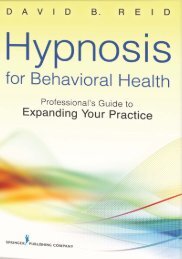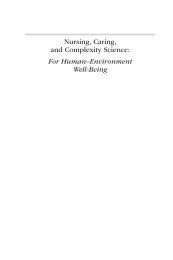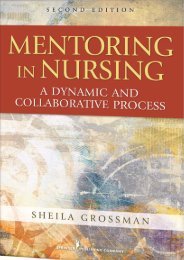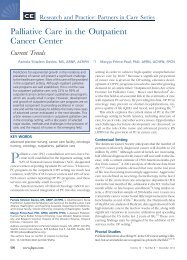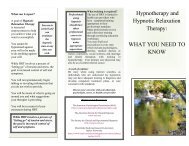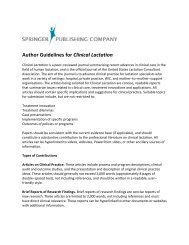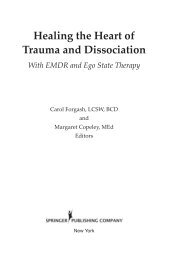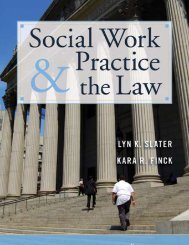Expertise in nursing practice : caring, clinical judgment - Springer ...
Expertise in nursing practice : caring, clinical judgment - Springer ...
Expertise in nursing practice : caring, clinical judgment - Springer ...
You also want an ePaper? Increase the reach of your titles
YUMPU automatically turns print PDFs into web optimized ePapers that Google loves.
12 <strong>Expertise</strong> <strong>in</strong> Nurs<strong>in</strong>g Practice<br />
STAGE 3: COMPETENCE<br />
With moreexperience, the number of potentially relevant elements of a<br />
real-world situation that the learner is able to recognize becomes overwhelm<strong>in</strong>g.<br />
At this po<strong>in</strong>t, s<strong>in</strong>ce asense ofwhat is important <strong>in</strong> any particular<br />
situation is miss<strong>in</strong>g, performance becomes nerve wrack<strong>in</strong>g and<br />
exhaust<strong>in</strong>g, and the student might wonder how anybody ever masters<br />
the skill.<br />
To cope with this problem and achieve competence, people learn<br />
through <strong>in</strong>struction or experience to adoptahierarchical perspective.<br />
First, they must devise a plan or choose aperspective, whichthendeterm<strong>in</strong>esthoseelements<br />
of the situationto be treatedasimportant and those<br />
that can be ignored. By restrict<strong>in</strong>g themselves toonly a few of the vast<br />
number of possibly relevant facts and features, decision mak<strong>in</strong>g becomes<br />
easier.<br />
Thecompetent performer must devise new rules and reason<strong>in</strong>g procedures<br />
forthechosen plan orperspective determ<strong>in</strong>ationso that learned<br />
rules foractions based onrelevant facts can thenbe applied. These rules<br />
are not aseasily come by as the rules given beg<strong>in</strong>ners <strong>in</strong> texts and lectures.<br />
The problem is that there are a vast number of different situations<br />
that the learner may encounter, many differ<strong>in</strong>g from each other <strong>in</strong> subtle,<br />
nuanced ways, and <strong>in</strong> each a plan or perspective must be determ<strong>in</strong>ed.<br />
There are, <strong>in</strong> fact, more situations than can be named or precisely def<strong>in</strong>ed,<br />
so no one can prepare forthe learner a list of what to do <strong>in</strong> each<br />
possible situation. Thus,competent performers have to decideforthemselves<br />
what plan to choose without be<strong>in</strong>g sure that it will be appropriate<br />
<strong>in</strong> the particular situation. Now, cop<strong>in</strong>g becomes frighten<strong>in</strong>g rather<br />
than exhaust<strong>in</strong>g, and the learner feels great responsibility for his or her<br />
actions. Priorto this stage, if the learned rules did notwork out, the performer<br />
could rationalize that he had not been given good enough rules<br />
rather than feel remorse because ofa mistake. Of course, at this stage,<br />
th<strong>in</strong>gs often work out well, and a k<strong>in</strong>d of elation unknown to the beg<strong>in</strong>ner<br />
isexperienced, so learners f<strong>in</strong>d themselves on anemotional roller<br />
coaster.<br />
This comb<strong>in</strong>ation of necessity and uncerta<strong>in</strong>ty <strong>in</strong>troduces animportant<br />
new type ofrelationship between the performer and his or her environment.<br />
The novice and the advanced beg<strong>in</strong>ner, apply<strong>in</strong>g rules and<br />
maxims, feel little orno responsibility for theoutcome oftheir acts. If<br />
they have made no mistakes, an unfortunate outcome is viewed asthe<br />
result of <strong>in</strong>adequately specified elements or pr<strong>in</strong>ciples. The competent



